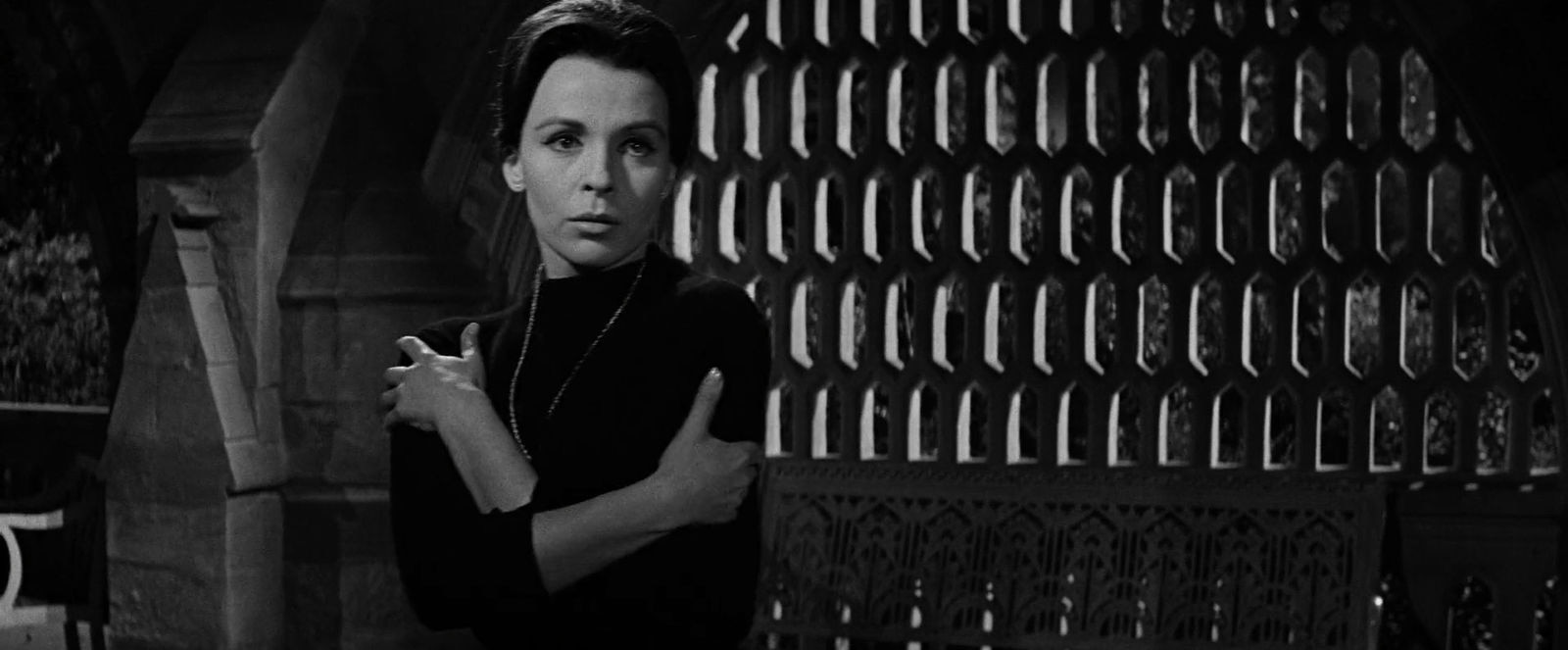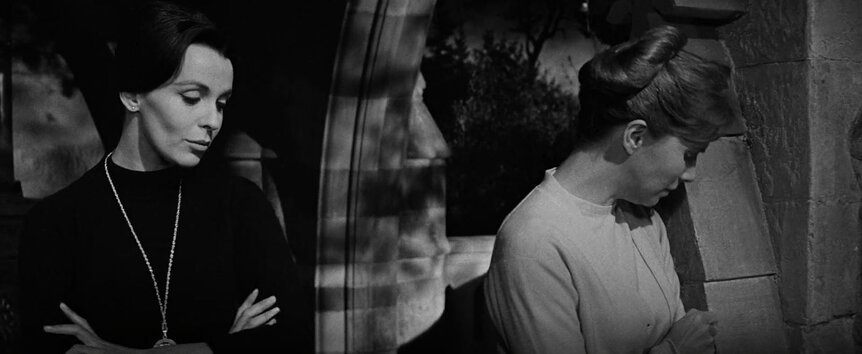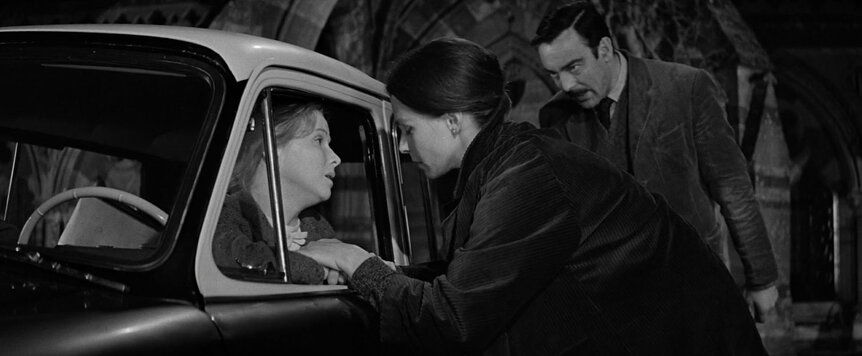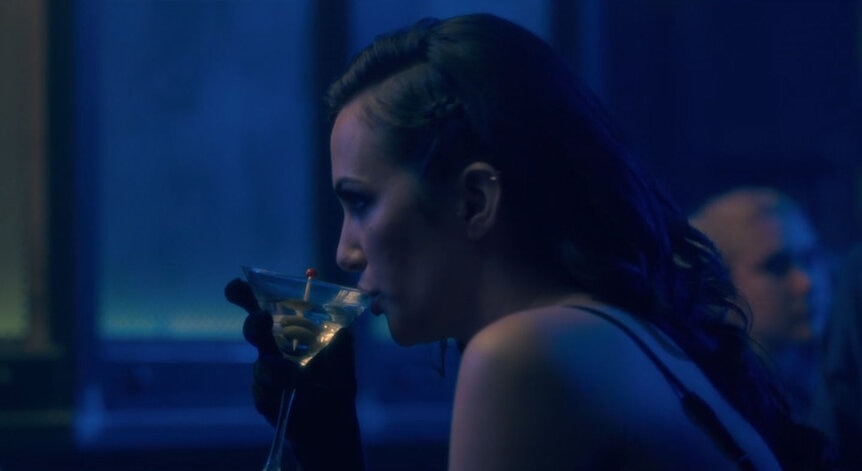Create a free profile to get unlimited access to exclusive videos, sweepstakes, and more!
The lasting importance of Haunting of Hill House's Theodora

In October of 1959, Shirley Jackson’s fifth novel The Haunting of Hill House was released by Viking Press, quickly earning rave reviews. It was Jackson's first book to earn back its advance, and would eventually come to be known as one of the greatest ghost stories ever written. The writer’s failing health would, unfortunately, ensure that she wrote only one more book past Hill House, but its legacy lives on for horror fans as it changes mediums and morphs to fit new times and new audiences. Recently, Netflix unleashed a new series loosely based on the novel, and it was well-received by longtime fans as well as new audiences that had never heard of Jackson's book.
The story of The Haunting of Hill House is compelling for many reasons, one of note being the bohemian artist and psychic Theodora, who draws the perhaps romantic attention of the point of view character, Eleanor. Theo has been as consistent and important to the continuing narrative and different interpretations of Hill House as the house itself, and she has been present in all the new versions of the story that have emerged over the years. Meanwhile, her importance to queer horror fans is impossible to overstate. In every appearance, Theo has been either openly or strongly implied to be queer, even in her first appearances in the late '50s and early '60s. To put it mildly, positive portrayals of a black-clad bohemian lesbian were not exactly frequent for the time.
For years, horror was the most likely genre in which the general public would encounter a queer female character. LGBTQIA characters were banned, strongly discouraged, and erased from texts in most art and mediums, and of course, early expression of these themes was used to villainize. From queer vampires to Norman Bates to Mrs. Danvers, nearly any vague, subtextual portrayal of queerness would involve characters that were predatory and deranged.Regardless of medium, the story of Hill House remains much the same. Jackson’s original idea for the text was inspired by watching an interview with a group of mediums who had been sent to investigate a haunted house. Jackson felt their dismissal and attempts to reason with the existence of ghosts were misguided and self-deceptive. Thus, we have a ghost story in which the characters consistently attempt to negotiate with what they believe to be lapses in their own sanity as the ghosts of Hill House drive them to argue and endanger themselves in its attempts to keep them there forever. To Jackson, arguing with oneself about the existence of ghosts rather than how to deal with the ghosts was a case of battling symptoms rather than the disease.
Eleanor and Theo are the women who are brought in to deduce whether or not Hill House is truly haunted. Eleanor is running from a bleak life as the eternal indentured servant of her sister and brother-in-law. After she receives the invite to Hill House from Dr. Montague (whose name is changed to Markway in the 1963 film), she steals the family car and travels to meet him. However, she meets Theo first, an artist who had just gone through an "argument with a roommate," strongly implied to be a temporary separation with her live-in girlfriend.
In Shirley Jackson’s novel, the dynamic between Theo and Eleanor is markedly different from follow-up takes. Eleanor attaches to Theo far more than she does to the other characters. Theo is indifferent to Nell’s crush, although Theo is implied to be lesbian several times throughout the book, particularly when she casually rambles about her “friend” she shares an apartment with. When Nell stops her to ask, “Are you married?” Theo sticks on the question for a beat before answering in the negative. As the house becomes more and more malicious, and Nell continues to question her own sanity, she makes declarations to Theo, deciding aloud at one point to follow Theo back to her apartment in the city when their time at Hill House ends. Theo is surprised and gently refuses her, but Nell insists.
The first adaptation of the novel would be Robert Wise’s 1963 version, in which much of the story is the same but the pace is much quicker. The Wise take on Theo is flippant and easily bored; she monopolizes the room’s attention with her seemingly effortless intelligence and insight. She takes pride in using her psychic abilities to guess what people are going to say before they say it and is moody when Nell won’t interact with her. Nell remains fixated on Theo, but there is an added element of repulsion in her feelings. Nell’s actions are exacerbated by the house, and one of the signs of her growing anger against the group and loyalty for the house is the sharp tone she takes with Theo, of whom she is initially very fond. Theo is hurt and bewildered by Nell’s displeasure but remains committed to helping her up to the very end.
Theo’s queerness is emphasized, while Nell’s decreases. Nell’s interest is on Doctor Markway, and it is Theo who is jealous. When Luke attempts to massage her shoulders, she loses her temper and demands that he keep his hands off of her. Meanwhile, she shows no such hesitance with Nell, leading her about by the shoulders and reassuring her sweetly. Nell and Theo are at odds with one another after Theo tells Markway under no uncertain terms that he’s the one accountable if something happens to Nell, and Nell calls Theo “unnatural” and one of “nature’s mistakes,” strongly implying homophobic disgust with Theo. For the standards of the time, especially in a horror film, this scene is dealt with highly sympathetically. The talkative Theo tries to respond but fails.
Claire Bloom’s Theo is a definitive take on the character, and it’s important to be clear that the success of the portrayal is largely due to Bloom’s unbelievable acting chops. Her onscreen intensity and the way her eyes move over every object in every room, darting between people as they speak but focusing on Nell, conveys more about her character than nearly any line in the script does.
The 1999 version of the film has been panned by critics fairly regularly since its release, and it is true that the take is a lot more shallow and makes a lot of heavy-handed mistakes in a tale that is known primarily as a study in implication and subtlety. This version of Theo was portrayed as being more flippant than clever or cool, and her psychic abilities are downplayed. Likewise, the attraction between her and Eleanor is much vaguer, and it falls pretty flat. This is unfortunate and detrimental to the movie because the dynamic between Theo and Nell is always one of the most interesting parts of the story. Without that sound dynamic there to build upon and the ‘90s tendency towards spelling out every detail of the plot, the movie didn’t stand much of a chance.On the other hand, the recent Netflix series managed to go in some interesting new directions while remaining true to the ever-shifting character of Theodora. In this tale, the Crain family moves into Hill House in hopes of flipping it, but the five children (including characters Nell and Theo, who are sisters now) can’t shake the suspicion that there’s something deeply wrong with the place. The mother eventually dies from an apparent suicide, but her husband and their children aren’t so sure. As adults, they receive news of their sister Nell having returned to the house to die in the same way their mother did, and they must all struggle with memories of Hill House and how it has affected their lives.
In this version, we get to see a lot of Theo and the development of her psychic powers as a kid, as well as what her life as a queer woman actually looks like. She is no longer an artist, but a psychiatrist who works with troubled children, at least one of whom she appears to relate to a great deal. She wears gloves to protect her from seeing too much of other people’s lives through touch, which involuntarily triggers her psychic abilities. Her interactions with her family are standoffish and brutally honest, and we see how a fear of emotional intimacy defines much of her existence. This version of Theo was complex and filled with a sense of regret that would have seemed incompatible with other takes on the character. Through a modern lens, Theo’s extreme sensitivity and her somber awareness of things unseen added another angle to a longtime favorite. Kate Siegel is iconic in the role and brings a lot of energy to the script.
Besides everything, Theo always manages to survive against all odds past the end of the story. The time period that produced her was certainly not known for holding a particularly tolerant view of homosexuality. Female characters that have personality traits similar to Theo’s were almost always villainized in books and films of the late ‘50s & early ‘60s. Her role in Hill House is always prominent, and the subtext around her queerness has been consistently obvious and relevant to the plot.In Theo, Shirley Jackson created a classy artist with a sharp, slightly cruel sense of humor. For her dreamy, gentle, ultimately lost Eleanor, Theo was someone to idolize and harbor secret feelings and affections for. In the 1963 film, Theo is much more jealous and Nell cares less for her than she cares for Nell. Theo’s constant attention to Nell and disdain for the others is different from the novel, but it works. In 1999's The Haunting Theo's attraction to Nell remains, even if it isn’t as focused as it in the other takes. Finally, in the most recent Netflix series, Theo seems to come closer than ever to the spirits that inhabit Hill House, yet she still survives and thrives beyond the conclusion of the show. Discussions of Bury Your Gays and the many brutal deaths of queer characters is ongoing, but in that conversation, Theo stands out for being an imperfect, fallible queer woman consistently being subjected to life-threatening situations yet still walking away from them, evolving rather than fading away.
In her many forms, The Haunting of Hill House's Theo is valuable to queer audiences specifically because she has never been turned into a morality tale or a tragedy. Alongside so many negative portrayals of queer women, Theo’s nearly unflappable bravery, her excellent personal style, and her impressive intellect, memory, and intuition make her one of the most enduring queer characters of genre.





























